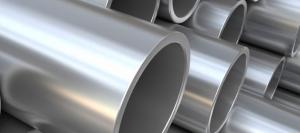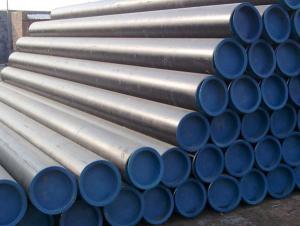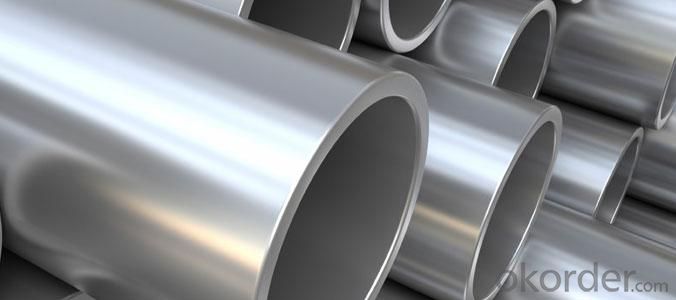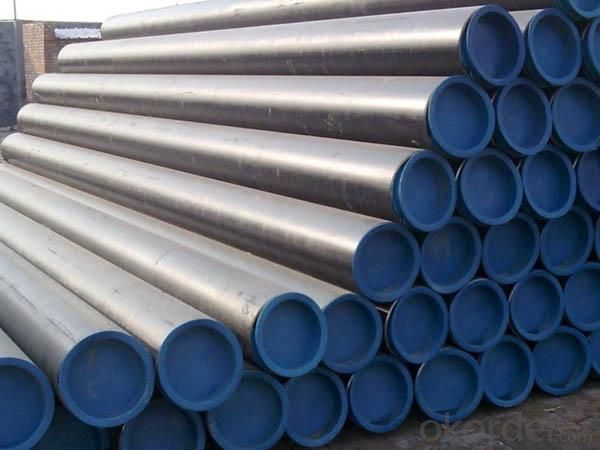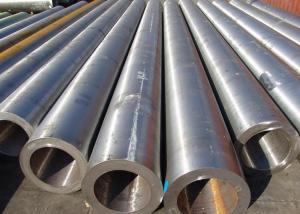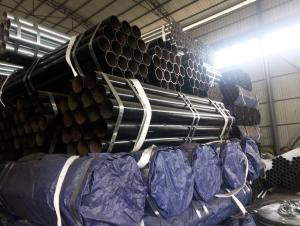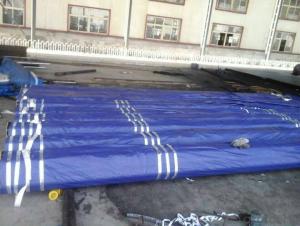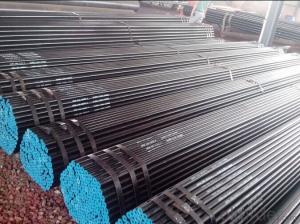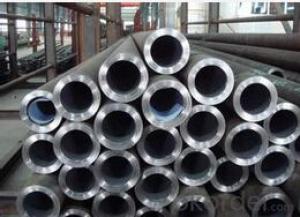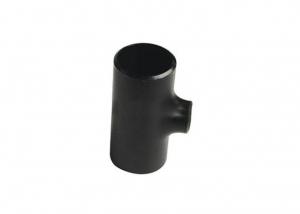Seamless Carbon And Alloy Steel Mechanical Tubing
- Loading Port:
- China Main Port
- Payment Terms:
- TT or LC
- Min Order Qty:
- 50mt m.t.
- Supply Capability:
- 5000 Tons Per Month m.t./month
OKorder Service Pledge
OKorder Financial Service
You Might Also Like
Specifications of Seamless Carbon And Alloy Steel Mechanical Tubing
ASTM A179 Seamless Carbon and Alloy Steel Mechanical Tubing
JIS G3441 Alloy steel tubes for machine purposes
MECHANICAL SEAMLESS STEEL TUBING
Usage of Seamless Carbon And Alloy Steel Mechanical Tubing
Applicable to the general structure, mechanical structure with seamless steel tubes.
Quality Standard of Seamless Carbon And Alloy Steel Mechanical Tubing
ASTM A 53 Standard Specification for Pipe, Steel, Black and Hot-Dipped, Zinc-Coated, Welded and Seamless
ASTM A519 Seamless Carbon and Alloy Steel Mechanical Tubing
GB/T8162 Seamless Steel Tubes for Structural Purposes
JIS G3441 Alloy steel tubes for machine purposes
JIS G3444 Carbon steel tubes for general structural purposes
JIS G3445 Carbon steel tubes for machine structural purposes
DIN 2391 Seamless Precision Steel Tubes
EN10305 Steel tubes for precision applications. Technical delivery conditions. Seamless cold drawn tubes
EN 10210:Seamless structural steel pipes
Welcome to here: cheeralli at hnssd dot com. thanks
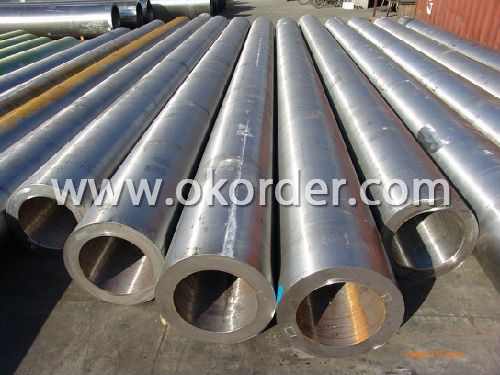
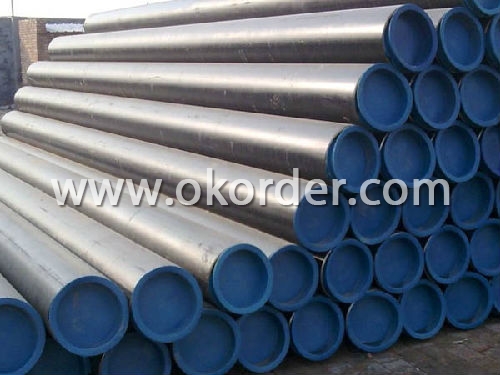
- Q: Seamless steel pipe is how to do it?
- 1. seamless steel tubes for structural purposes (GB/T8162-1999) are seamless steel tubes for general structural and mechanical construction.2. seamless steel pipe for fluid transportation (GB/T8163-1999) is used to transport water, oil, gas and other fluids of general seamless steel pipe.3. seamless steel tubes for low and medium pressure boiler (GB3087-1999) is used in the manufacture of various structures of low and medium pressure boiler superheated steam pipe, superheated steam pipe, boiling water pipe and boiler flue tube, pipe and brick arch tubes of high quality carbon steel hot rolling and cold drawing (rolling) seamless steel tube.4. high pressure boiler seamless steel tube (GB5310-1995) is used for the manufacture of high-pressure and above the pressure of water boiler heating surface for high-quality carbon steel, alloy steel and stainless steel heat-resistant seamless steel pipe.5. high pressure seamless steel tube (GB6479-2000) for chemical fertilizer equipment is a kind of high quality carbon structural steel and alloy steel seamless pipe for chemical equipment and pipes of working temperature of -40~400 DEG C and working pressure of 10~30Ma.6. seamless steel tubes for petroleum cracking (GB9948-88) are tubes, heat exchangers and seamless steel tubes used in refineries.
- Q: What are the common applications of galvanized steel pipes?
- Galvanized steel pipes are commonly used in various industries and applications such as plumbing, water supply systems, gas pipelines, electrical conduits, construction projects, fencing, and outdoor structures. The galvanization process adds a protective zinc coating to the steel, making it resistant to corrosion and extending its lifespan, making it ideal for applications requiring durability and longevity.
- Q: What is the minimum wall thickness for steel pipes?
- The minimum wall thickness for steel pipes depends on various factors such as the pipe size, pressure rating, and intended use. However, as a general guideline, the minimum wall thickness for steel pipes is typically determined by industry standards and regulations, and it can range from a few millimeters to several inches. It is important to consult specific codes and standards relevant to the application to accurately determine the required minimum wall thickness for steel pipes.
- Q: What are the different types of steel pipe coatings for underground applications?
- The different types of steel pipe coatings for underground applications include fusion bonded epoxy (FBE), polyethylene (PE), polyurethane (PU), and coal tar enamel (CTE).
- Q: Can steel pipes be used for underground sewage systems?
- Yes, steel pipes can be used for underground sewage systems. Steel pipes have high strength and durability, making them suitable for carrying sewage and withstanding the pressure and environmental conditions underground. Additionally, steel pipes have excellent corrosion resistance properties, which is crucial for sewage systems that are exposed to moisture and various chemicals.
- Q: What is the cost of steel pipes compared to other materials?
- The cost of steel pipes can vary depending on various factors such as size, grade, and market conditions. However, generally speaking, steel pipes tend to be more cost-effective compared to other materials like copper or PVC. Steel is a durable and versatile material that offers exceptional strength and longevity, making it a popular choice for various applications.
- Q: Are steel pipes suitable for transporting gas?
- Yes, steel pipes are suitable for transporting gas. Steel pipes are known for their durability and strength, making them ideal for transporting gas safely over long distances. They are resistant to corrosion and can handle high pressure, making them a reliable choice for gas transportation.
- Q: What are the different types of steel pipe fittings for gas pipelines?
- There are several types of steel pipe fittings commonly used for gas pipelines, including elbows, tees, reducers, flanges, and couplings. Elbows are used to change the direction of the pipeline, while tees are used to create branch connections. Reducers are used to connect pipes of different sizes, and flanges are used for connecting pipes with valves or other equipment. Couplings are used to join two pipes together.
- Q: Can steel pipes be used for oil transportation?
- Indeed, steel pipes find application in the transportation of oil. In the oil and gas industry, steel pipes are widely utilized to transport crude oil, petroleum products, and natural gas. The reason behind their popularity lies in their robustness, endurance, and resistance to corrosion. Steel pipes possess the capability to endure high-pressure conditions, making them suitable for both onshore and offshore oil transportation. Moreover, by welding steel pipes together, extensive pipelines can be constructed, thereby providing a cost-efficient method to transport oil across long distances. In conclusion, steel pipes serve as a dependable and effective option for oil transportation.
- Q: Can steel pipes be used for steam systems?
- Yes, steel pipes can be used for steam systems. Steel pipes are commonly used in steam systems due to their durability, high temperature resistance, and ability to handle high pressure.
1. Manufacturer Overview
| Location | Jiangsu, China |
| Year Established | 2005 |
| Annual Output Value | Above US$100 Million |
| Main Markets | Main land; Middle East; Southeast Asia |
| Company Certifications | ISO 9001:2008 |
2. Manufacturer Certificates
| a) Certification Name | |
| Range | |
| Reference | |
| Validity Period |
3. Manufacturer Capability
| a) Trade Capacity | |
| Nearest Port | Shanghai |
| Export Percentage | 61% - 70% |
| No.of Employees in Trade Department | 390People |
| Language Spoken: | English; Chinese |
| b) Factory Information | |
| Factory Size: | Above 600,000 square meters |
| No. of Production Lines | Above 10 |
| Contract Manufacturing | OEM not offered |
| Product Price Range | Average |
Send your message to us
Seamless Carbon And Alloy Steel Mechanical Tubing
- Loading Port:
- China Main Port
- Payment Terms:
- TT or LC
- Min Order Qty:
- 50mt m.t.
- Supply Capability:
- 5000 Tons Per Month m.t./month
OKorder Service Pledge
OKorder Financial Service
Similar products
Hot products
Hot Searches
Related keywords
